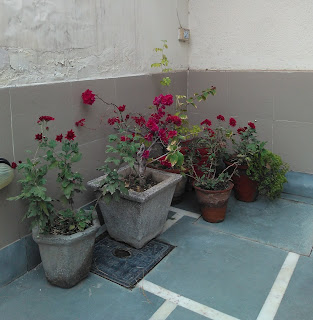Continuing from my last post on our organic farming adventures, let me give a lowdown on what we achieved in the last couple of months. While the brinjal plant gave us quite a bounty...
...we planted some new veggies. Tomatoes, ladyfingers, capsicum, spinach, fenugreek and garlic were the new additions to our garden. Since the tomatoes and capsicums are still growing, they probably won't give fruits anytime soon. But the spinach, garlic and fenugreek have given us some yummy homegrown leafy greens. (I was so enthusiastic to consume my greens that I forgot to take pictures of the fenugreek crop!)
We also discovered how pretty the ladyfinger flower looks...
... before the actual vegetable springs forth.
But most importantly, we discovered the power of composting.
Composting
By the simple act of digging a pit into which we put our wet waste everyday, we have managed to get sustainable on so many levels.
- If the garbage man doesn't turn up for a few days (as he was often wont to doing in the summer), we only have dry waste to manage. No tensions of dealing with smelly, rotting stuff; the pit has already taken care of that.
- Every month we cover up the old compost pit and dig a new one. About 4-6 weeks later, depending on the weather, the old pit is dug up and all our wet waste has magically converted to the best possible compost for our plants. So no buying or using chemical fertilizers, ensuring we consume the veggies we grow in the purest form.
- Feeding everything from fruit and vegetable peels to egg shells and tea leaves to our pit, we make sure the soil quality in our yard improves. From a mix of sandy and clayey soil with bits of concrete, the backyard is already looking up with a nutrient-rich loamy sort of soil slowly taking over.
In the end, it is a cycle - if we give back to nature and let it take it's own course, one sure is in safe hands. Even in our pollution-overdosed world... Think about it!

























